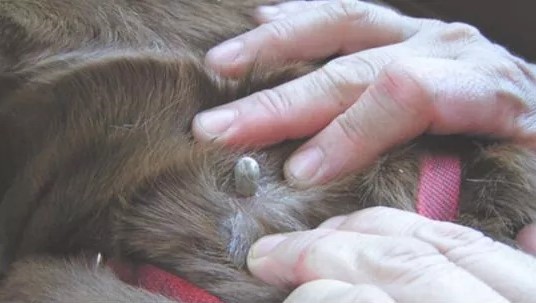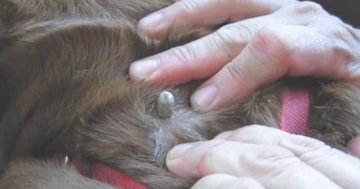
It’s tick season in Canberra and the South Coast. Photo: Gungahlin Veterinary Hospital.
A shortage of tick antivenom has been declared by vets nationwide, particularly affecting pets in Canberra and on the South Coast.
Antivenom, also known as tick serum or tick anti-toxin is used to treat animals suffering from tick paralysis – an envenomation in animals that can become fatal if left untreated.
This week alone, two patients have presented to the Gungahlin Veterinary Hospital with tick paralysis.
Gungahlin Veterinary Hospital vet Dr Michael Hayward said there had been concerns among vets in Canberra and its surrounds regarding the limited supply of the antivenom available.
“The paralysis tick Ixodes holocyclus causes paralysis, breathing distress and death – unless treated early,” Dr Hayward said.
“It occurs along the entire eastern seaboard of Australia, generally up to 50 kilometres inland from the coast.
“[It affects] dogs, cats, sometimes calves and even people.”
Dr Hayward said tick antivenom is the only treatment for animals showing symptoms from ticks.
The Gungahlin vet said although it wasn’t uncommon for ticks to attach to companion animals and people each month, spring was always the worst season for infection, partially due to the number of Canberrans visiting the coast with their pets.
“We are seeing the usual seasonal upswing in tick cases in springtime,” Dr Hayward said.
“In the last six years, we’d average four cases per year.
“So far we’ve had two cases this month which were both young dogs who had visited the South Coast.”
Neither of the dogs had been provided with tick preventative treatment from their owners.
Dr Hayward said the main cause of dogs getting infected with ticks included failure to use effective tick prevention when entering a tick area, visiting tick prevalent areas and exposure to vegetation, including scrub and bushland. Ticks can also be picked up in suburban gardens and on manicured lawns.

Vets are urging pet owners to make sure their furry four-legged friends are up to date with their tick prevention treatments. Photo: File.
Although Canberra vets were likely to have the antivenom in stock, Dr Hayward said it was unclear when they would receive an increased supply.
“There is no alternative medicine to treat the tick paralysis, but supplies may be available in the next few weeks,” he said.
“All vets are concerned about the lack of availability of tick antivenom, but I’ve not heard that Canberra vets have yet run out.
“We will continue to treat animals as required, and we are about to advise our clients of the need for tick preventative strategies.”
The main symptoms of tick paralysis to look out for include weakness in the hind legs, coughing, a different sounding bark or meow, heavy breathing, vomiting, collapsing and heavy salivation (drooling).
Dr Hayward said pet owners should always be concerned about ticks.
“Prevention is highly effective, and prevents illness and suffering, the risk of death, owner distress, and is very much cheaper than treatment,” he said.
“If you have concerns, seek veterinary advice and always use an effective (most recent generation) tick preventative which can be provided by your local vet.”
The Moruya Veterinary Hospital at the South Coast has also urged their patients to prepare for the tick season.
“There is a severe shortage of tick serum,” Moruya Veterinary Hospital vet Dr Janelle Dunkley said.
“Please make sure your animal’s tick prevention is all up to date.
“We recommend Bravecto, Nexguard and Nexguard Spectra for dogs and Bravecto Plus for cats.”
To find out more information about tick paralysis and tick treatment, visit Vet Voice.
Original Article published by Evelyn Karatzas on Riotact.












